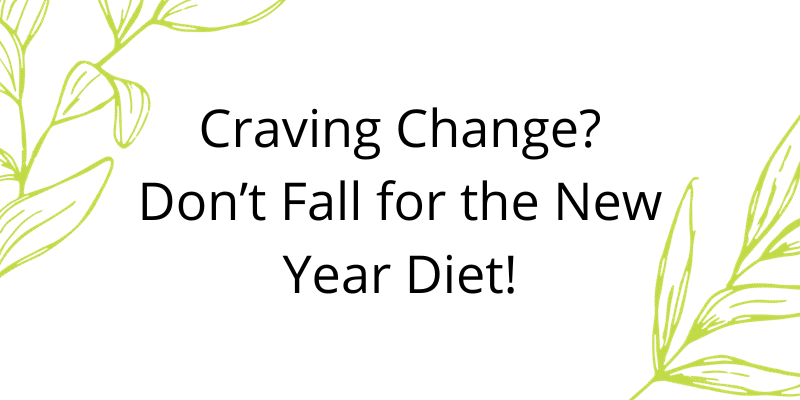Craving Change! Don’t Fall for the New Year Diet!
HAPPY NEW YEAR!!
Welcome to 2024! We hope that you have had a fantastic Christmas and New Year, and that you are all fired up to kick off the new year with a positive mindset.
New year is traditionally the time to start new health and fitness plans, and whilst this is good, it should serve more as a check point rather than a full-on change of lifestyle. Gradual changes become habits more easily than trying to change lots of things at once which is much harder to sustain.
Resist the temptation of new year diets which promise you a huge weight loss in an extremely short amount of time, as they are simply not sustainable, not healthy long term, and can lead to feelings of failure and disappointment.
Have a look at these five well-known extreme diets that are advertised all over magazines and social media at this time of year, and why they don’t work!
- Very low-calorie diets. Hmm where do I start? These diets often restrict calories to as little as 800 calories a day. Who can function properly on 800 calories a day? I know I certainly can’t. Eating too few calories can lead to nutritional deficiencies and potentially harm your health. Whilst they can show results in the short term, they are extremely hard to sustain long-term and can lead to feelings of depravation, extreme hunger, fatigue and failure when you are unable to keep it going, as well as causing muscle loss and a slow metabolism, as your body adjusts to conserve energy. In the long run, this will make weight loss more challenging. Severely restricting calories may deprive your body of essential nutrients which can impact your energy levels, immune function and overall well-being. We need to fuel our bodies properly. Avoid this extreme diet unless under the guidance of a medical professional.
- Fad diets. Fad diets such as the grapefruit diet, cabbage soup diet or baby food diet focus on eating specific foods and promising fast weight loss. These types of diets lack variety and are deficient in nutrients. They can have a huge impact on your social life, they can be boring and difficult to stick to, making them unsustainable. With all the variety of food out there, why would you only want to eat one thing?
- Juice cleanses/Detox diets/Liquid diets. These diets involve consuming only fruit or vegetable juices for a number of days. They claim to detoxify the body, but there’s no scientific evidence that supports this. Our kidneys and liver are extremely efficient at detoxing the body and we don’t need anything else. Juice cleanses are short of essential nutrients like fibre and protein, and the weight lost during the cleanse is often water weight, which is quickly regained once regular eating resumes. Again, like with the fad diets, they can be boring, restrictive and affect your social life as well as leaving you very hungry.
- Ketogenic diet. The Keto diet is very low in carbohydrates and high in fats. It forces the body into a state of ketosis, where the body burns fat for energy. Some weight loss might be experienced but it is very hard to sustain because of the strict restriction of carbohydrates. The Keto diet can lead to nutrient deficiencies and can have potential health risks such as fatigue, dizziness and nausea, kidney stones due to the high fat intake, digestive issues such as constipation due to changes in fibre intake and strain on the liver (especially if you already have a pre-existing liver condition). Only follow this diet under the strict guidance of a medical professional where it can be properly monitored.
- Paleo diet. The Paleo diet eliminates processed foods, grains, legumes and diary and instead, focuses on foods similar to those eaten by early humans during the Palaeolithic era such as fish, lean beef, poultry, non-starchy vegetables, low-sugar fruit. nuts and seeds and healthy fats. While this diet promotes whole foods and avoids processed foods, it does have some potential drawbacks. Excluding entire food groups (or significantly limiting them) from the diet, such as grains and dairy, can lead to nutrient deficiencies. The restriction of grains and legumes can result in a lower fibre intake which can impact digestive health. Following this diet can be challenging and might not be sustainable for everyone.
These extreme diets don’t work because often they are unsustainable, nutritionally imbalanced, and socially isolating.
Long-term achievement in managing weight loss comes from having a balanced, varied, and sustainable eating habit, combined with regular physical activity and a positive mindset. Consulting a healthcare professional or a registered dietitian can help individuals create a personalised and sustainable nutrition plan.
Look out for our next blog which will explain how to lose weight in a healthy way without depriving yourself of your favourite foods, without being hungry and still being able to eat out with your friends.
Much Love
Caroline & Hannah xx
